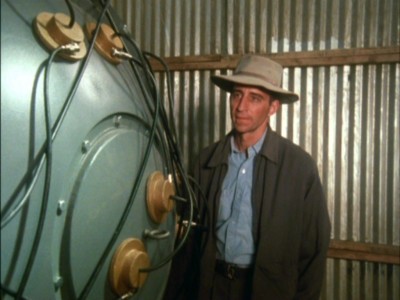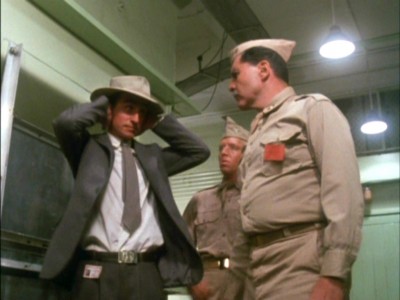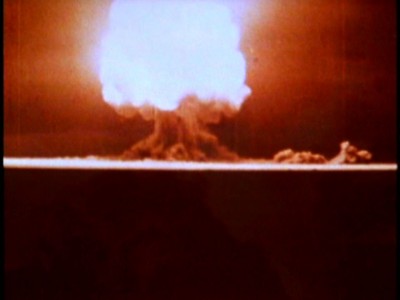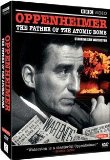| Reviews & Columns |
|
Reviews DVD TV on DVD Blu-ray 4K UHD International DVDs In Theaters Reviews by Studio Video Games Features Collector Series DVDs Easter Egg Database Interviews DVD Talk Radio Feature Articles Columns Anime Talk DVD Savant Horror DVDs The M.O.D. Squad Art House HD Talk Silent DVD
|
DVD Talk Forum |
|
|
| Resources |
|
DVD Price Search Customer Service #'s RCE Info Links |
|
Columns
|
|
|
Oppenheimer
Author's note: This review is based on an advanced screener disc - not the final shelf product. Subsequently, ratings on the video and audio are not final, nor is there any mention of extras (such as an episode guide or an informational brochure) nor of the disc's packaging. When and if I receive the final shelf product, I will amend the review.

BBC Video and Warner Bros. have released the six-part miniseries, Oppenheimer, a 1980 co-production between the BBC and WGBH Boston that first premiered here in the United States on PBS's American Playhouse back in the spring and summer of 1982. Starring Sam Waterston as Oppenheimer, the "father of the atomic bomb," Oppenheimer plays it quite fair (for the most part) in delineating Oppenheimer's enthusiastic achievements in marshaling the massive "Manhattan Project" that delivered the atomic bomb to America (and a victory over Japan in WWII), while exploring Oppenheimer's foibles in his personal relationships, as well as his ill-considered naivete concerning global politics. Anyone looking to confirm their romantic, one-sided image of Oppenheimer as some kind of martyr to American political "witchhunts" of the 1950s, might want to look elsewhere.
Densely plotted, nothing but a short, condensed summary of events in Oppenheimer would be appropriate for this review. Beginning in the autumn of 1938, the miniseries starts in Berkeley, California, where pampered, tenure-safe professors, safe on the shores of peaceful America, dabble in radical politics as the world heads inevitably towards war. J. Robert Oppenheimer (Sam Waterston, excellent as always), a professor of physics at the University of California, has, along with practical physicist Ernest Lawrence (Bob Sherman), built up the university's physics department to rival the great scientific institutions in Europe. "Oppy," as he's known by his students, is embroiled in a corrosive, destructive relationship with Jean Tatlock (Kate Harper), a depressive, disparaging socialite who belongs to the Communist Party. Forever goading on Oppy to officially join the Party (his constant donations of money and time aren't considered enough for the shrewish Tatlock), Tatlock has nothing but contempt for Oppy's at-length standoffishness at joining the cause - a move he feels will seriously hamper his career. He's a committed "fellow traveler," but he can't make the final move to an official Party member - just like he can't officially commit to Jean.
Two events - one personal, one scientific - combine to change Oppy's life forever and catapult him from a moderately successful theoretician to a world famous figure. First, the knowledge that successful fission experiments in Europe will lead to a race for "super weapons" spurs Oppy to pursue a role in the government's efforts to develop an atomic bomb. Pushing Oppy forward in this goal is his new wife Kitty Harrison (Jana Sheldon), a vivacious romantic partner who, quite unlike Jean, sees in Oppy an opportunist who can get ahead in his career during the coming war years. Selected by gruff, no-nonsense Army General Leslie Groves (Manning Redwood) to head up the government's efforts to build an atomic bomb, Groves recognizes that Oppy's scientific credentials, matched with his (conflicted) desire to make a real name for himself in the scientific community, is the perfect combination he's looking for in a supervisor who can gather together the tens of thousands of vague scientific inquires, questions, and theories from the thousands of American scientists working on the bomb, and fashion a workable project that delivers the goods within the ridiculously short time they're given.
Oppy, cognizant of the realities that are involved with the military running this massive scientific show (a reality the "head in the clouds" scientists detest), proves to be the perfect conduit between the scientists who constantly want to find the most "elegant" method of designing the bomb, and the military that wants something, anything that will blow up - and quickly, before the Germans and the Japanese beat them to the punch. Oppy succeeds beyond his wildest dreams, enthusiastically delivering up the bomb while at the same time, wringing his hands over the effects of its monumentally destructive delivery. However, once the war is over, and Oppy returns to his high-wire act of dangerously flirting with radical politics, the government, looking for political victims at the height of the Cold War, moves in to shut down Oppenheimer as a national "security risk."
Seeing Oppenheimer again over twenty-five years after first watching it back in '82, I was struck at how careful it was throughout its six hour running time to portray Oppenheimer in a "fair" light. Except for a few significant omissions, the film is unstinting in presenting a view of Oppenheimer that isn't at all "mythic" or grandly, tragically heroic - which of course is tantamount to sacrilege for liberal historians and politicians who love to invoke Oppenheimer's "martyred" name when discussing the issue of McCarthyism and the power of the U.S. military industrial complex in the 1950s. While politics certainly play a part in the film's larger outer view, Oppenheimer always underpins the monumental political and scientific events in Oppenheimer's life with his personal strengths and weaknesses. The film begins with the heady world of late 30s American university and college academia flirting with radical politics, asserting in the opening narration that many of these teachers felt socialism (and by extension, communism) was the only political theory that was dealing with the worldwide rise of fascism and militarism. Of course, these teachers believed this while willingly blinding themselves to the horrific effects of socialism and communism in Russia - a fact that Oppenheimer fairly points out when Oppenheimer mentions the disparaging comments from scientists who recently came back from working in Russia, scientists who were thoroughly disillusioned with the naive utopianism they previously held for the Communist state.

But no matter how aware Oppenheimer was of this seeming dichotomy between idealistic political beliefs and the harsh reality of the true nature of socialism and communism, he continued throughout his career to flirt with radical politics - a fact that the film isn't afraid to pin on Oppenheimer as one of the main sources of his personal and professional troubles. Why Oppenheimer did this is a tricker matter, but the film seems to suggest it was a combination of Oppenheimer's reluctance to commit to anything, including going along with the military's insistence that he function as a stereotypical loyal, patriotic American - something he most certainly was, but at the expense of his personal radical politics - and, as Groves states quite accurately, Oppenheimer's refusal to face his own ambition. Groves (who is rather unfairly portrayed as a slightly buffoonish character here - as are all the military figures) states that Oppenheimer wasn't any different than anyone else in their desire to "get ahead" and do great things, but that as an intellectual, he had to have the resulting consequences of that ambition - the death of thousands of people at the hands of the A-bomb - "sugar coated" for him.
The film is quite complex in showing an Oppenheimer who wanted to be both a radical and a thoroughly rigid "establishment figure" (it's Oppenheimer's initial idea to put the scientists at Los Alamos in uniforms with rank, not the military's). Dichotomy of self-interest seemed to war constantly within Oppenheimer, according to the film. Knowing that seeing Jean Tatlock was toxic to his own self-image, self-esteem, and self-worth, he still continues to see her - even though it jeopardizes his security clearance with Groves, and puts a strain on his marriage to Kitty. Even though he expresses a desire to share atomic science secrets with the Soviets, he refuses to go along with such a plan when a friend, Haakon Chevalier (Peter Marinker), offers up this treason at war time. And when, quite sensibly, the military wants further information when Oppenheimer himself goes to military intelligence to inform on Chevalier's espionage activities, he refuses to name anyone else Chevalier may have contacted - and goes so far as to make up a story and lie about these activities to the military, when such an act, as he well knew from his own dealings with the military in Los Alamos, was a suspicious act that could be taken as a sign that he was sympathetic to these very same espionage activities. And even as events heat up back in America immediately after WWII and during the start of the Cold War, Oppenheimer jeopardizes his own position in the Atomic Energy Commission when he continues to consort with Communists, including Chevalier, an admitted espionage agent, when such an act could only be described as a perverse desire on Oppenheimer's part to see how far he could push the government and military before they lowered the boom on him.
As well, the film is layered in its treatment of Oppenheimer as a conflicted pragmatist who recognized the great opportunity the "Manhattan Project" afforded him - while chronicling his equally conflicted views on the aftermath of the A-bomb effects. While most contemporary accounts of Oppenheimer's activities like to stress the "blood on my hands" aspects of his guilt over the development of the A-bomb (a view that fits in perfectly with a majority of today's writers who have their own political agenda), Oppenheimer the film is much more balanced in showing how Oppenheimer actively sought out and embraced the development of the bomb for the express purpose of defeating Japan, going so far as to veto objections by other scientists like Lawrence who wanted to give Japan warning of what was to come. Indeed, the Oppenheimer of Oppenheimer is at the same time a tortured socialist, a hardened realist who, in addition to believing that scientists aren't the only ones to pass moral judgments on the results of their experiments, appreciated the opportunity the military gave him to develop a project he would never have realized in his university career, as well as the "rightness" of developing the bomb in the first place - a fact that doesn't go away despite Oppenheimer's eventual back and forth equivocation, later in his career, over the development of the "Super," the thermonuclear H-bomb.
Oppenheimer still can't resist leaving out some of the more unsavory aspects of Oppenheimer's career - specifically the fact that the "martyr" of McCarthyism willingly and enthusiastically "named names" of "fellow travelers" during his final security clearance hearing, even though his clearance was due to expire anyway (the government made a point of taking it away from him, when they could have just let it lapse). That mercenary fact always seems to be conveniently left out when contemporary accounts of Oppenheimer revel in the government "witchhunts" of that time (much is made in the film of Oppenheimer's brother Frank, played by Garrick Hagon, losing his teaching position because of his Communist Party affiliation, but nothing is ever said of the men's fates who were ratted out by Oppenheimer in his public display of defiance against the government). But for much of Oppenheimer, the portrayal of Oppenheimer is inclusive - and decidedly mixed.

The DVD:
The Video:
The full-screen, 1.33:1 video transfer for Oppenheimer isn't the greatest, but much of that can probably be chalked up to the original source materials. Switching between 16mm and video (as was the norm, then, for British TV shows), the visual continuity of Oppenheimer varies, with the old video looking quite harsh at times, with greenish colors and some video noise, while the 16mm elements look much better. Still, overall, not bad considering the original materials.
The Audio:
The English mono audio track has the expected slight hiss and occasional warble at times, but for the most part, the dialogue is clear, and close-captions help.
The Extras:
There's a segment of the Edward R. Murrow See It Now program included here, from 1954, that features Oppenheimer speaking to Murrow about some rather complicated issues - in an astoundingly clear manner. It runs 25:39 minutes.
Final Thoughts:
Densely plotted and quite complex in its portrayal of the deeply conflicted, talented J. Robert Oppenheimer, 1980's Oppenheimer is a fascinating miniseries that may challenge your preconceived notions of the "father of the atomic bomb." Sam Waterston is excellent in the lead role. I recommend Oppenheimer.
Paul Mavis is an internationally published film and television historian, a member of the Online Film Critics Society, and the author of The Espionage Filmography.


|
| Popular Reviews |
| Sponsored Links |
|
|
| Sponsored Links |
|
|
| Release List | Reviews | Shop | Newsletter | Forum | DVD Giveaways | Blu-Ray | Advertise |
|
Copyright 2024 DVDTalk.com All Rights Reserved. Legal Info, Privacy Policy, Terms of Use,
Manage Preferences,
Your Privacy Choices | |||||||














